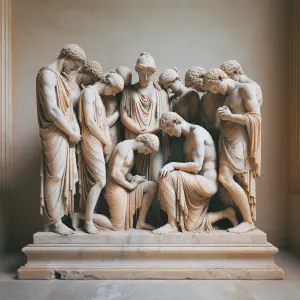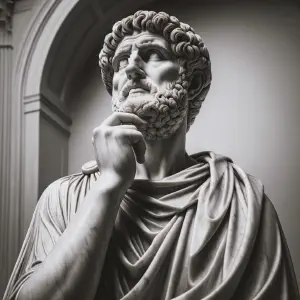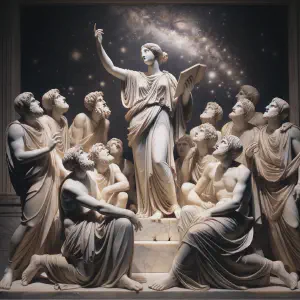The Light of Wisdom and the Coming Kingdom
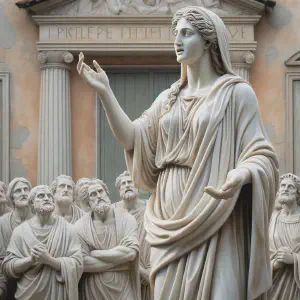
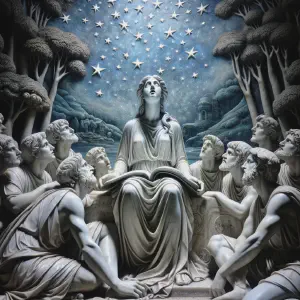
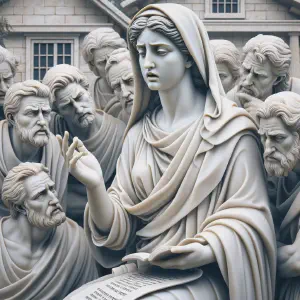
In the days that followed, the villagers found themselves transformed. The wisdom Eliana shared ignited a new understanding and perspective within them. They realized that the Kingdom of God was not a physical realm to be sought out, but a spiritual state to be cultivated within. They learned that true wisdom lay in recognizing the presence of the divine in their daily lives and that in embracing this wisdom, they too could become friends of God and prophets of His word. Eliana’s teachings, rooted in ancient scripture, had sown seeds of faith and understanding, nurturing a community grounded in the light of divine wisdom and the hope of the coming Kingdom.
Five Questions
What does the story “The Light of Wisdom and the Coming Kingdom” convey about the nature of wisdom according to the Book of Wisdom?
Wisdom, as described in the Book of Wisdom, is portrayed as a divine force, characterized by purity, agility, and clarity. It’s an embodiment of God’s power and goodness, untainted by evil. The story reflects this by depicting wisdom as a guiding light, surpassing even the sun and stars in its brilliance, and it’s through this divine wisdom that we gain a deeper understanding of God’s will and the world around us.
How does Psalm 119 relate to the theme of enduring truth and guidance in the story?
Psalm 119 emphasizes the eternal and unchanging nature of God’s word, paralleling the story’s theme of enduring truth and guidance. It suggests that God’s teachings are as firm as the heavens and remain relevant through all generations. This underscores the idea that divine wisdom and guidance are constant and reliable sources of enlightenment in our ever-changing world.
In the story, Eliana teaches about the Kingdom of God based on Luke 17:20-25. What is the significance of Jesus’ teachings in this context?
Jesus’ teachings in Luke 17:20-25 highlight the spiritual nature of the Kingdom of God. He explains that it’s not a physical realm observable by sight but is instead present among us. This aligns with the story’s message, where the villagers learn to recognize the Kingdom of God within themselves, emphasizing the importance of internal spiritual growth and understanding over external searches for the divine.
How does the story interpret Jesus’ warning about the coming of the Son of Man in Luke 17?
The story interprets Jesus’ warning as a caution against literal and external interpretations of the second coming of Christ. Just as lightning unpredictably lights up the sky, the coming of the Son of Man is an event beyond human prediction and control. This teaches the villagers, and by extension the readers, to focus on spiritual preparedness and understanding rather than seeking physical signs or locations.
What overall message does “The Light of Wisdom and the Coming Kingdom” impart to its readers regarding their spiritual journey?
The overall message of the story is the importance of seeking and embracing divine wisdom in our spiritual journey. It teaches that true enlightenment and understanding of God’s kingdom come from within, through faith, scripture, and the recognition of God’s presence in our daily lives. This inward journey prepares us for the coming of Christ and fosters a deeper, more meaningful connection with the divine.
Bible Study
Wisdom 7:22b–8:1
In Wisdom is a spirit
intelligent, holy, unique,
Manifold, subtle, agile,
clear, unstained, certain,
Not baneful, loving the good, keen,
unhampered, beneficent, kindly,
Firm, secure, tranquil,
all-powerful, all-seeing,
And pervading all spirits,
though they be intelligent, pure and very subtle.
For Wisdom is mobile beyond all motion,
and she penetrates and pervades all things by reason of her purity.
For she is an aura of the might of God
and a pure effusion of the glory of the Almighty;
therefore nought that is sullied enters into her.
For she is the refulgence of eternal light,
the spotless mirror of the power of God,
the image of his goodness.
And she, who is one, can do all things,
and renews everything while herself perduring;
And passing into holy souls from age to age,
she produces friends of God and prophets.
For there is nought God loves, be it not one who dwells with Wisdom.
For she is fairer than the sun
and surpasses every constellation of the stars.
Compared to light, she takes precedence;
for that, indeed, night supplants,
but wickedness prevails not over Wisdom.Indeed, she reaches from end to end mightily
and governs all things well.
This passage personifies Wisdom as an intelligent, holy, and unique spirit, emanating from God. It portrays Wisdom as all-encompassing, penetrating all things with purity and clarity. This aligns with Catholic values of seeking divine guidance and understanding in life, emphasizing the importance of wisdom as a gift from God that leads to moral and spiritual enlightenment. The passage reflects the Catholic belief in the interplay of human intellect and divine grace.
Psalm 119:89, 90, 91, 130, 135, 175
R. (89a) Your word is for ever, O Lord.
Your word, O LORD, endures forever;
it is firm as the heavens.
R. Your word is for ever, O Lord.
Through all generations your truth endures;
you have established the earth, and it stands firm.
R. Your word is for ever, O Lord.
According to your ordinances they still stand firm:
all things serve you.
R. Your word is for ever, O Lord.
The revelation of your words sheds light,
giving understanding to the simple.
R. Your word is for ever, O Lord.
Let your countenance shine upon your servant,
and teach me your statutes.
R. Your word is for ever, O Lord.
Let my soul live to praise you,
and may your ordinances help me.
R. Your word is for ever, O Lord.
Psalm 119 celebrates the enduring nature of God’s word, attributed to King David, a central biblical figure known for his deep devotion to God despite his flaws. The Psalm’s emphasis on the everlasting truth and reliability of God’s commandments resonates with Catholic teachings about the consistency of divine law, as laid out in the Ten Commandments and the Church’s catechisms. It advocates for a life guided by God’s statutes, a reflection of the acts of mercy and a life in grace.
Luke 17:20-25
Asked by the Pharisees when the Kingdom of God would come,
Jesus said in reply,
“The coming of the Kingdom of God cannot be observed,
and no one will announce, ‘Look, here it is,’ or, ‘There it is.’
For behold, the Kingdom of God is among you.”Then he said to his disciples,
“The days will come when you will long to see
one of the days of the Son of Man, but you will not see it.
There will be those who will say to you,
‘Look, there he is,’ or ‘Look, here he is.’
Do not go off, do not run in pursuit.
For just as lightning flashes
and lights up the sky from one side to the other,
so will the Son of Man be in his day.
But first he must suffer greatly and be rejected by this generation.”
In this passage, Jesus, the central figure of Christianity, addresses the Pharisees, a group often depicted in conflict with Him due to their strict adherence to the law and lack of understanding of Jesus’ teachings. Jesus clarifies that the Kingdom of God is not a physical realm but exists within the believers, highlighting the Catholic value of recognizing God’s spiritual presence in everyday life. This aligns with the Catholic teachings on grace, as it suggests that the Kingdom of God is a state of being in grace, attainable through faith and righteousness, not through external observance alone.
Lessons
These sacred passages teach us the unparalleled value of divine wisdom, which surpasses all earthly knowledge and beauty. Wisdom, as an emanation of God’s power and purity, is untainted by evil and illuminates the path to righteousness. The enduring nature of God’s word, as expressed in the Psalms, stands as a testament to the unshakable truth and guidance provided to us through scripture. The Gospel of Luke imparts the vital lesson that the Kingdom of God is not a physical domain to be found externally, but a spiritual presence within us, revealed through faith and understanding. These teachings remind us to seek spiritual enlightenment and recognize the presence of God in our daily lives, preparing our hearts for the coming of Christ.
Meditation Prayer
